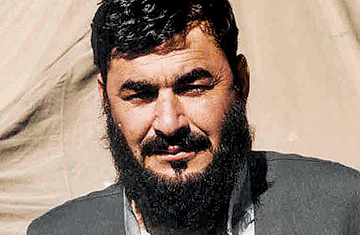
Bashir Noorzai, an Afghan who is on the United States' list of most wanted drug kingpins.
(6 of 8)
That was not what the Americans believed. On June 1, 2004, the White House put out a press release listing the top 10 international drug kingpins, who "present a threat to the national security, foreign policy, or economy of the United States." Robert Charles, then Assistant Secretary of State, recalls that when he saw the draft list, he asked, "Why don't we have any Afghan drug lords on the list?" An interagency debate ensued, then a scramble to come up with names. Several popped up. And so, on the final list, coming in at No. 10 was the name "Haji Bashir [sic] Noorzai."
Noorzai was the smallest of the big fish, but only because the list included Latin American heavyweights at the time considered the most powerful and dangerous crime families on the planet. It is possible, a sign of either immense confidence or sloppiness, that Noorzai did not know he had made the top 10 kingpin list that was posted on international law-enforcement websites. But a simple Google search might have warned him off his next move.
Back in Dubai for more talks in August, the Americans made a dramatic proposal. They told Noorzai they would like him to meet more senior officials and that the U.S. was the place to do it. Noorzai responded cautiously: only, he says in a transcript, "if they make sure we become free people and don't capture us." The agent named Brian tried to allay Noorzai's fears: "After this meeting, the immediate threat to apprehend [you] will be diminished." Brian then told Noorzai if he didn't want to go to the U.S., the meeting could take place in Dubai or Pakistan.
Brian emphasized the benefits of Noorzai's turning over good intelligence: "Any high-quality information [you] can provide us ... on money movements, on other key people we should be talking to ... the more cooperation we get from [you], the more [you're] going to be seen as a tremendous asset in this effort back in the United States." Noorzai clearly thought he could offer all that. "I'm not afraid of you [Americans] now," he told his inquisitors. "When do we go to America?"
Had he known more about American politics and the eternal tensions between branches of government, he might not have been so ready to hop on a plane. Given his new ranking as a kingpin, it would have been potential political suicide for any U.S. official to make a public deal with him. Prosecutors and agents bargain with traffickers all the time, but for lighter sentences, better jails or better food. Once Noorzai was officially a villain on a wanted poster, his value as an asset was falling fast.
